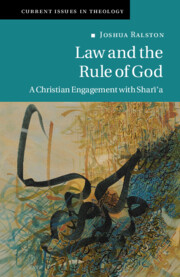Book contents
- Law and the Rule of God
- Current Issues in Theology
- Law and the Rule of God
- Copyright page
- Dedication
- Contents
- Acknowledgments
- Notes on Transliteration and Texts
- 1 Christian Political Theology as Comparative Theology
- 2 Neither Conciliation nor Confrontation
- 3 “That Hideous Schizophrenia”
- 4 The Difficulty with Distinctions
- 5 Building a Christological Legal Foundation
- 6 The Witness of the Law in Comparative Perspective
- Conclusion
- Select Bibliography
- Index
5 - Building a Christological Legal Foundation
A Comparative Political Theology after Karl Barth
Published online by Cambridge University Press: 28 October 2020
- Law and the Rule of God
- Current Issues in Theology
- Law and the Rule of God
- Copyright page
- Dedication
- Contents
- Acknowledgments
- Notes on Transliteration and Texts
- 1 Christian Political Theology as Comparative Theology
- 2 Neither Conciliation nor Confrontation
- 3 “That Hideous Schizophrenia”
- 4 The Difficulty with Distinctions
- 5 Building a Christological Legal Foundation
- 6 The Witness of the Law in Comparative Perspective
- Conclusion
- Select Bibliography
- Index
Summary
Through critical engagement with Karl Barth, the chapter develops a Christian theology of law responsive to Muslim critiques. It opens by challenging Barth’s negative portrayal of Islam and the rhetorical connection that he makes between National Socialism and Islam. While criticizing Barth’s views, the chapter draws from Barth’s thinking on law and politics to respond to explicit Muslim worries about Christian politics in general and Isma’il Ragi al-Faruqi’s reading of Barth more specifically. This is developed through a close reading of three essays written between 1935 and 1946 where Barth develops the groundwork for a Christologically controlled theological politics. To draw out the potential of these essays, the chapter suggests ways that Randi Rashkover’s nonpolemical reading of Barth’s theology of law in the context of Jewish-Christian debate might be extended to Islam. While Barth’s thought provides important tools for a theology of public law – particularly the non-oppositional dialectic between gospel and law and his account of the law as witness – his theology is still hampered by fundamentally anti-Islamic rhetoric and a lack of concrete attention to public laws.
Keywords
- Type
- Chapter
- Information
- Law and the Rule of GodA Christian Engagement with Shari'a, pp. 199 - 252Publisher: Cambridge University PressPrint publication year: 2020

